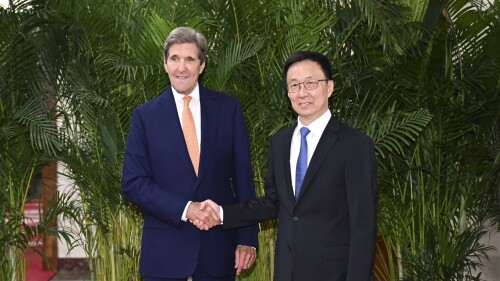NANGAN, Taiwan (AP) For the past month, bed and breakfast owner Chen Yu-lin has had to tell his guests that he couldn’t provide them with the Internet.
Others living in Matsu, one of Taiwan’s outlying islands closest to neighboring China, have struggled to pay electricity bills, make a doctor’s appointment, or receive a package.
To connect to the outside world, 14,000 residents rely on Matsus two submarine internet cables which leads to the main island of Taiwan. The National Communications Commission, citing the island’s telecommunications service, accused two Chinese vessels of cutting cables. He said a Chinese fishing vessel is suspected of having severed the first cable some 50 kilometers (31 miles) out to sea. Six days later, on Feb. 8, a Chinese cargo ship cut through to the second, NCC said.

The Chinese vice president says his country is willing to work with Washington to reduce global warming as long as his political demands are met.

Amid a sharp downturn in relations with the United States, China has been eyeing a meeting with former US National Security Advisor and Secretary of State Henry Kissinger to revive the positive momentum.

China is criticizing Taiwan’s vice president and presidential leader William Lai’s upcoming stopover in the United States as a challenge to its territorial integrity, while Taiwan says it is merely a transit stop.

US climate envoy John Kerry is holding talks with his Chinese counterpart in Beijing as the US seeks to restore ties with China that have been severed by disputes over trade, Taiwan, human rights and land claims.
The Taiwanese government stopped calling it a deliberate act by Beijing and there was no direct evidence to show that Chinese ships were responsible.
Islanders meanwhile have been forced to connect to a limited Internet via microwave radio transmission, a more mature technology, as a backup. It means you could wait hours to send a message. Calls dropped and videos were unwatchable.
Many tourists would cancel their booking as there is no internet. Nowadays, the Internet plays a very important role in people’s lives, said Chen, who lives in Beigan, one of the main residential islands in Matsu.
In addition to disrupting lives, the seemingly harmless loss of Internet cables has huge implications for national security.
As the full-scale invasion of Ukraine demonstrated, Russia has made the elimination of the Internet infrastructure a key part of its strategy. Some experts suspect China may have deliberately cut the cables as part of its harassment of the self-ruled island it considers part of its territory, to be forcibly reunited if necessary.
China regularly send warplanes and navy ships to Taiwan as part of tactics to intimidate the island’s democratic government. Concerns about the invasion of China, and Taiwan’s readiness to resist it has increased since the war in Ukraine.
Cables have been cut a total of 27 times over the past five years, but it was unclear which country the vessels came from, based on data from Chunghwa Telecom.
The Taiwan Coast Guard gave chase to the fishing vessel that cut the first cable on Feb. 2 but returned to Chinese waters, according to an official briefed on the incident and not authorized to discuss the matter publicly. Authorities found two Chinese vessels in the area where the cables were cut, based on data from the GPS-like automatic identification system that shows a vessel’s location.
We can’t rule out that China destroyed them on purpose, said Su Tzu-yun, a defense expert at the government think tank, Institute for National Defense and Security Research, citing research that found only China and Russia had the technical capabilities to do so. Taiwan needs to invest more resources in cable repair and protection.
Internet cables, which can be 20 to 30 millimeters (0.79 in to 1.18 in) wide, are encased in steel armor in shallow waters where they’re more likely to run into ships. Despite the protection, the cables can be cut quite easily by ships and their anchors, or by fishing vessels using steel nets.
Even so, this level of rupture is highly unusual for a cable, even in the shallow waters of the Taiwan Strait, said Geoff Huston, chief scientist at the Asia Pacific Network Information Center, a nonprofit that manages and distributes Internet resources such as IP addresses for the region.
Without a stable Internet connection, coffee shop owner Chiu Sih-chi said seeing the doctor for her young children’s colds became a hassle because before they only had to visit the hospital to make an appointment.
The owner of a breakfast shop said she lost thousands of dollars in the past few weeks because she usually accepts orders online. Her customers came to her stall expecting their food to be ready when she hadn’t even seen their messages.
Faced with unusual difficulties, the residents of Matsu have come up with all sorts of ways to organize their lives.
One couple planned to deal with the upcoming high season by having one person stay in Taiwan to access their reservation system and pass the information to the other via text messages. Wife Lin Hsian-wen extended her vacation in Taiwan during the off-season when she heard the Internet at home was down, and she will return to Matsu later in the week.
Some enterprising residents have traveled to the other shore to buy SIM cards from Chinese telecommunications, though they only work well at points closest to the Chinese coast, which is only 10 kilometers (6.21 miles) away at its closest.
Others, like bed-and-breakfast owner Tsao Li-yu, traveled to the Chunghwa Telecom office to use a Wi-Fi hotspot that the company had set up for locals in the meantime.
I was on my way to work at (Chunghwa Telecom), Tsao joked.
Chunghwa had set up microwave transmission to support residents. Broadcast from Yangmingshan, a mountain just outside Taipei, the capital of Taiwan, the relay broadcasts signals approximately 200 kilometers (124 miles) to Matsu. Since Sunday, speeds have been significantly higher, residents said.
Wang Chung Ming, the county chief of Lienchiang, as the Matsu Islands are officially called, said he and the Matsu lawmaker traveled to Taipei shortly after the internet went down to ask for help, and were told they would be given priority in any future internet backup plan.
Taiwan’s Ministry of Digital Affairs has publicly asked for bids from low-Earth orbit satellite operators to provide Internet in a back-up plan, after seeing Russia’s cyberattacks during its invasion of Ukraine, the ministry chief, Audrey Tang told the Washington Post last fall. The ministry said the project falls outside the law which requires suppliers to be owned by at least 51% of a domestic shareholder.
A spokesman for the Ministry of Digital asked the National Communications Commission about the progress of the backup plans. NCC said it will install a surveillance system for undersea cables, relying on microwave transmission as a backup option.
Many Pacific island nations, before they started using wired Internet, depended on satellites, and some still do as a backup, said Jonathan Brewer, a New Zealand telecommunications consultant who works across Asia and the Pacific.
There is also the question of cost. Repairing the cables is expensive, with an initial estimate of $30 million New Taiwan Dollars ($1 million) for the vessels work alone.
Chinese boats that damaged the cables should be held accountable and pay compensation for the costly repairs, said Wen Lii, head of the ruling Democratic Progressive Party’s Matsu branch.
Wang, the county head of Lienchiang, said he mentioned the cables on a recent visit to China, where he met with a China Mobile executive. They offered to send technicians to help. But compensation, he said, will require you to provide hard evidence about who did it.
China’s Taiwan affairs office did not respond to a faxed request for comment.
For now, the only thing residents can do is wait. The earliest cable ship that can arrive is April 20, because there are a limited number of ships that can do the job.
Even a month without a functional Internet has its positive sides. Chen Yu-lin, the owner of the bed and breakfast, felt more at peace.
The first week was tough, but Chen got used to it quickly. Life-wise, I think he’s much more comfortable because you get fewer calls, he said, adding that he spent more time with his son than he usually plays online.
In a web cafe where off-duty soldiers played offline, the effect was the same.
Our relationship has become a little closer, said a soldier who gave only his name, Samuel. Because normally when there’s the internet, everyone keeps to themselves and now we’re more connected.
___
Associated Press video reporter Taijing Wu of Taipei, Taiwan contributed to this report.
___
This story has been corrected to show that the backup satellite plan falls outside the law that requires providers to be at least 51% owned by a national shareholder.
___
Find more access points with Asia-Pacific coverage at https://apnews.com/hub/asia-pacific

